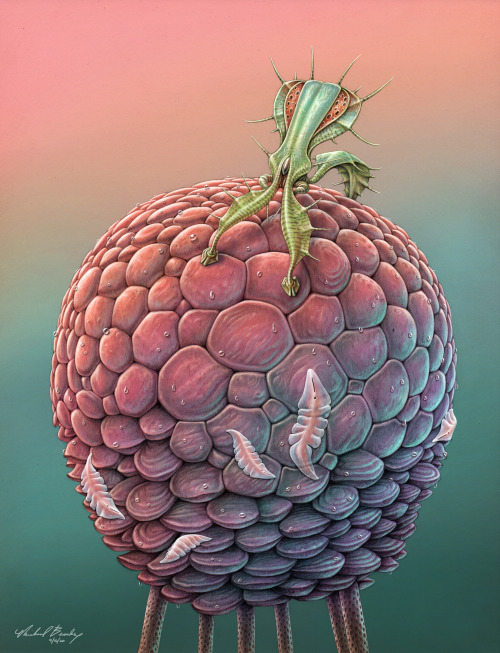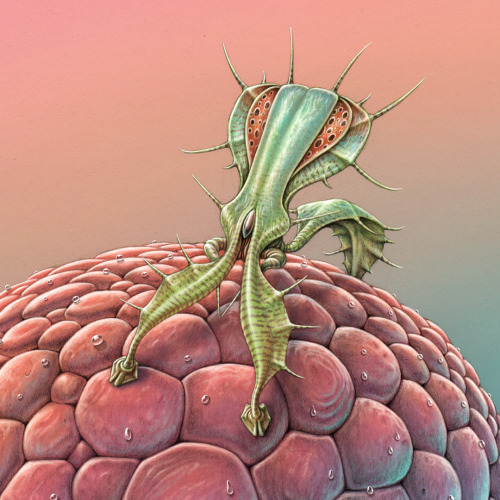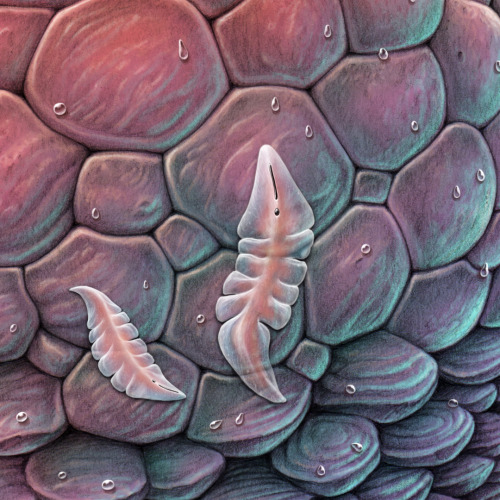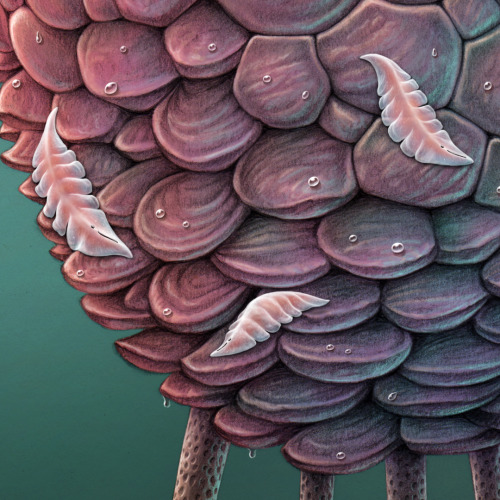In The Shadow Of Colossus




In the Shadow of Colossus
Veteris is a geologically dynamic world, with active plate tectonics that thrust huge mountains high into the sky. One of the highest ranges is Colossus, which contains peaks well over 50,000 feet tall. Here on its outskirts, deep valleys have formed, whose unfortunate position robs them of sunlight for most of the daytime.
These twilight conditions are not favorable for creatures with high photosynthetic needs, but provide opportunities for others. The ominous Valley Plate-globes are covered in dark panels that absorb as much sunlight as possible during the short daylight hours. Rising far above the ground are the Skycolumns, who extend their fleshy fronds when the sun is directly overhead. Their main body column is heavily buttressed to prevent being toppled by strong winds.
The particular species of tube carpet that covers the valley floor grows a large glowing bulb which carries a multitude of its microscopic embryos. Once the bulb reaches a certain size and luminosity, it attracts the attention of mobile creatures, who by eating it spread the tube carpet’s offspring far and wide. The primary patron at this bioluminescent buffet is the Ghost Celeriarma, a swift and well-defended denizen of the shadow lands. Like many inhabitants of Veteris, it utilizes a combination internal/external support structure that is both flexible and strong. A turret of eyes extends high above the rest of its body and gives it 360 degree surveillance capability. If eyesight should fail to detect a predator, its quick speed and sharp, moveable spines may keep it safe.
A far less athletic creature, the smaller Pluriped has instead developed camouflage to avoid predation. Lateral markings and a glowing bulbous growth of its own help it blend in to the shadowy sea of tube carpet.
More Posts from Exobiotica and Others





Herders
Out on the plains, a group of herders watches over its flock. At around 15 feet in height, the Magnavindix have flat tops, good for catching the sun’s rays to supplement their energy requirements through photosynthesis. The majority of their sustenance however, comes from the placid, defenseless Iumentus creatures they tend to. Imposing in stature and well armed, they play the role of defender, shepherd, and also matchmaker, bringing a pair of Iumentus together when their biolights signal readiness to breed. Indeed this symbiosis has grown so exclusive that the Magnavindix have evolved specialized appendages that are only useful in carrying the Iumentus. Having no concern for danger, the livestock are free to grow fat and slow as they wander the open plain, grazing on the expanse of the fibrous purple carpet creature that dominates this land. Other species benefit from this arrangement too. The shy Brush-faced Verecundas stay close to the herd as their giant guardians deter nearly all predators that would attempt to approach.




Cloud Grazers
Nubes comedenti
A family of Cloud Grazers seeks shelter from strong winds on the leeward side of a sheer rock face several hundred feet above the ground. Thanks to a lightweight body structure and internal hydrogen gas sacs, they are completely neutrally buoyant. Propelled by air jets on their sides, they are most at home at high altitude amongst the cliffs and mountain tops where they can hide from harsh weather and fierce predators. Most of their nutriment is obtained by way of their anterior filtration organs, which they extend while flying to sweep the sky of aerial biota - a sort of sky plankton.





Life in the Dark
In the murky blackness of the deep sea, creatures are spread out over immense distances. To find each other, many use biologically-generated light. But what appears to be a potential mate might instead be a lurking predator.




Guardian
On Veteris, it is common for creatures to obtain energy from multiple sources. The large round, multifaceted autotroph angles its plates to face the light at any given time of day. It also feeds on decomposing organic matter it obtains by moving slowly on its long spindly legs. Conversely, the spiny guardian on top originally evolved to hunt the semi-transparent flat creatures that feed on the autotroph, but came to rely on them exclusively. Over many generations, individuals that allowed some prey items to live and reproduce eventually outlasted the more aggressive hunters, and now their style of subsistence is closer to farming. The guardians now protect the entire micro-system – each large round walker and its flock of parasites is topped by a spiny guardian who has the dual task of defending against predators as well as keeping the herd numbers in check. A round walker without a guardian slowly succumbs to parasite overpopulation. Occasionally huge numbers of walkers congregate in vast gently-swaying miniature forests, each crowned by a flamboyant spiny guardian defending its small world.
Absolutely incredible work! Do you post anywhere else?
Thank you! Yes I’m on Instagram @exobiotica



More strange megafauna.

Egg Chamber
In some environments, it's hard to tell the difference between genders and species. Organisms share genetic material more easily on this planet, and that leads to some complicated taxonomy. In this case, we see a group of aquatic creatures acting as nurses for a seemingly endless field of eggs. But the network of underwater chambers in which they reside is in fact another living creature. By some categorizations, it would be considered the female of the species - it produces and to some extent nourishes the field of eggs, some of which mature to be gigantic network-chambers themselves. Whether this is an extreme example of sexual dimorphism, or the result of some sort of horizontal gene transfer is a matter of conjecture at this point.
I saw you're a graphic designer.
Are you commissionable for creature designs or similar projects?
If not that's OK. Like your art
I’m not currently available for commissions, sorry. I definitely will keep making art though. Glad you like it!
-
 delta-trox liked this · 3 weeks ago
delta-trox liked this · 3 weeks ago -
 brazilian-ceratosaurus liked this · 3 months ago
brazilian-ceratosaurus liked this · 3 months ago -
 sablesablesablesable liked this · 4 months ago
sablesablesablesable liked this · 4 months ago -
 gabnaturalist liked this · 4 months ago
gabnaturalist liked this · 4 months ago -
 fattcatt1123 liked this · 4 months ago
fattcatt1123 liked this · 4 months ago -
 carloscuriel liked this · 5 months ago
carloscuriel liked this · 5 months ago -
 potatosapien5 liked this · 5 months ago
potatosapien5 liked this · 5 months ago -
 astonishingdummy liked this · 5 months ago
astonishingdummy liked this · 5 months ago -
 wanderer2dream liked this · 6 months ago
wanderer2dream liked this · 6 months ago -
 falterjay liked this · 6 months ago
falterjay liked this · 6 months ago -
 onemillionfish liked this · 6 months ago
onemillionfish liked this · 6 months ago -
 goldymove liked this · 6 months ago
goldymove liked this · 6 months ago -
 alienworlds reblogged this · 6 months ago
alienworlds reblogged this · 6 months ago -
 deathlyborb liked this · 6 months ago
deathlyborb liked this · 6 months ago -
 the-archivist-raven liked this · 6 months ago
the-archivist-raven liked this · 6 months ago -
 nekroprejt reblogged this · 6 months ago
nekroprejt reblogged this · 6 months ago -
 xeno-bio-sociology reblogged this · 6 months ago
xeno-bio-sociology reblogged this · 6 months ago -
 fridjitzu liked this · 6 months ago
fridjitzu liked this · 6 months ago -
 bnnuytwice reblogged this · 6 months ago
bnnuytwice reblogged this · 6 months ago -
 darkwingphoenix liked this · 7 months ago
darkwingphoenix liked this · 7 months ago -
 swiperthefoxstolemyfamily liked this · 7 months ago
swiperthefoxstolemyfamily liked this · 7 months ago -
 bigbodds liked this · 7 months ago
bigbodds liked this · 7 months ago -
 partumreblogs liked this · 7 months ago
partumreblogs liked this · 7 months ago -
 canine-cosmonaut liked this · 7 months ago
canine-cosmonaut liked this · 7 months ago -
 tv1977 liked this · 7 months ago
tv1977 liked this · 7 months ago -
 deadsearisen liked this · 7 months ago
deadsearisen liked this · 7 months ago -
 surrendertomywill reblogged this · 8 months ago
surrendertomywill reblogged this · 8 months ago -
 merpdaberp liked this · 8 months ago
merpdaberp liked this · 8 months ago -
 critterbugboi liked this · 8 months ago
critterbugboi liked this · 8 months ago -
 jankiwen liked this · 8 months ago
jankiwen liked this · 8 months ago -
 tiredboxman liked this · 8 months ago
tiredboxman liked this · 8 months ago -
 n0esnadie liked this · 8 months ago
n0esnadie liked this · 8 months ago -
 bigdickbrinn liked this · 8 months ago
bigdickbrinn liked this · 8 months ago -
 darkfestpanda liked this · 8 months ago
darkfestpanda liked this · 8 months ago -
 farrvl liked this · 8 months ago
farrvl liked this · 8 months ago -
 tundragravedigger reblogged this · 8 months ago
tundragravedigger reblogged this · 8 months ago -
 tundragravedigger liked this · 8 months ago
tundragravedigger liked this · 8 months ago -
 tilbugs liked this · 8 months ago
tilbugs liked this · 8 months ago -
 transexualcow reblogged this · 8 months ago
transexualcow reblogged this · 8 months ago -
 gemderplantcat liked this · 8 months ago
gemderplantcat liked this · 8 months ago -
 flinny-so liked this · 9 months ago
flinny-so liked this · 9 months ago -
 stargirldraws liked this · 9 months ago
stargirldraws liked this · 9 months ago -
 idontfuckingknow123 liked this · 9 months ago
idontfuckingknow123 liked this · 9 months ago -
 sleepy-reindeer liked this · 9 months ago
sleepy-reindeer liked this · 9 months ago -
 dimensionwarp liked this · 9 months ago
dimensionwarp liked this · 9 months ago -
 crimnsontroll liked this · 9 months ago
crimnsontroll liked this · 9 months ago -
 topg143 liked this · 10 months ago
topg143 liked this · 10 months ago




